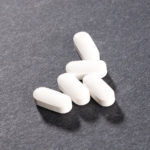By Bonnie Jenkins
Salt. It can bring out the flavor in many of the foods we eat and it’s critical to good health. In fact, we couldn’t survive without it. Sodium chloride, the technical name for salt, regulates blood pressure and fluid volume. It also carries nutrients into cells, keeps calcium and other minerals soluble in the blood, helps to regulate muscle contractions, plays a part in nerve stimulation and is necessary for the production of hydrochloric acid in the stomach. But too much can be just as dangerous as not enough, particularly for those who are sensitive to salt.
Salt sensitivity means that your blood pressure will respond when you change your dietary salt intake. It appears that some of us have salt sensitivity and react directly to salt intake, while others do not. So, how do you know if you’re sensitive to salt? Unfortunately, there isn’t a test for salt sensitivity, although researchers are working on developing one. But, while scientists still have much to learn about the mechanisms of salt sensitivity, they have identified various factors that can place you at higher risk, such as increased age, genetic variations, how well your kidneys excrete waste, and even race. It turns out that salt sensitivity rates are higher among African-Americans.
Open your arteries, improve blood flow for a new health miracle...
Did you know your circulatory system has over 60,000 miles of arteries, veins and other blood vessels, if stretched end to end?
But as you age, your blood vessels undergo changes, which may cause them to stiffen, thicken and get clogged.
GOOD NEWS! Doctors have now identified a “Miracle Molecule” inside your arteries that helps OPEN your arteries and IMPROVE blood flow.
It’s what Dr. Valentin Fuster calls it, "One of the most important discoveries in the history of cardiovascular medicine."To you, that means...
- Healthy blood pressure
- Sharper mind and memory
- Skyrocketing energy and muscular strength
- Increased pleasure and passion in the bedroom
- Improved circulation to every cell and organ in your body
Go here to discover a new natural way to significantly boost the levels of this miracle molecule in YOUR body NOW!
According to an article in the journal Hypertension, 26 percent of people with normal blood pressure and 51 percent of people with high blood pressure were found to be salt sensitive. That means that about one-quarter of otherwise healthy adults are salt sensitive and are unaware that they respond to increases in dietary salt intake with an increase in blood pressure.
Are You Suffering From...
- Love handles and a pot belly
- Romance that isn't what it used to
- Forgetfulness and inattention
- Low (or no) strength and endurance
- A sex drive that's shifted into neutral...or worse
If so...you may have Mature Male Burnout. Click here to discover more about this unique condition and what you can do about it.
But the danger goes far beyong high blood pressure. One study found that salt-sensitive subjects with normal blood pressure had similar death rates as people with high blood pressure. Salt sensitivity has also been recently linked to an increased risk for cardiovascular events and metabolic syndrome (a cluster of conditions that increase risk for heart disease and diabetes.) But, even though science doesn’t have all the answers, it looks like cutting back sodium can benefit everyone—whether you’re salt sensitive or not.
What can you do? The most important step you can take is to limit your dietary sodium to 2,300 mg per day. Yet, as many as 75 percent of Americans consume more than the suggested maximum. Even more compelling, the American Heart Association published new guidelines this year calling for all Americans to reduce their daily intake even more—to just 1,500 mg. This was previously the recommended limit for people at higher risk for cardiovascular disease.
If Americans, as a whole, cut a modest amount of salt from their daily diet, there would be an estimated 155,000 fewer heart attacks and strokes annually, according to a study published on January 20, 2010 in the New England Journal of Medicine. This could be as beneficial to your health as quitting smoking, losing weight, and using medications to reduce elevated cholesterol and hypertension.
According to another recent study, an overall sodium reduction may be as effective in preventing death as dietary strategies like eliminating trans fats and increasing fruit and vegetable consumption. Research has also shown that reducing sodium to about 2,000 to 2,600 mg. per day improved cardiovascular health and reduced the rate of heart attacks and stroke by 25 percent, despite only small reductions in blood pressure. Lowering your salt intake can also reduce the risk of gastric cancer, end-stage kidney disease, left ventricular hypertrophy, congestive heart failure, osteoporosis and bloating.
Luckily, it’s easy to limit your salt intake. First, get rid of the salt shaker. Keeping salt on the table is an invitation to overdo it. It’s also smart to reduce the amount of sodium you get from processed and prepared foods. About 75 percent of our dietary sodium intake comes from these foods. It’s even hiding in cottage cheese, French bread, pancake mix and instant oatmeal! But it isn’t just the salt you eat at home that’s a problem. Restaurant food is notoriously high in sodium. But cooking at home and learning to read food labels can go a long way toward taming your salt habit. And that may contribute to a longer, healthier low-salt life.
References:
Bibbins-Domingo K. Projected effect of dietary salt reductions on future cardiovascular disease. New England Journal of Medicine. 2010;362:590-599.
Dias-Neto M. Salt intake and risk of gastric intestinal metaplasia: systematic review and meta-analysis. Nutrition and Cancer. 2010;62:133-147.
Goodarz D. The Preventable Causes of Death in the United States: Comparative Risk Assessment of Dietary, Lifestyle, and Metabolic Risk Factors. PloS Medicine. 2009; 6: e1000058. doi:10.1371/journal.pmed.1000058






